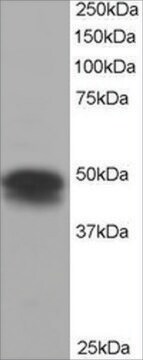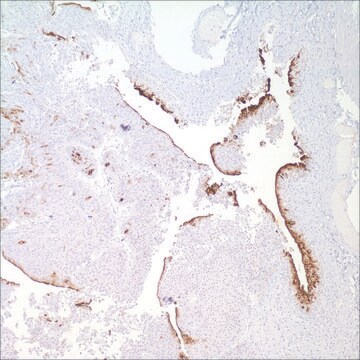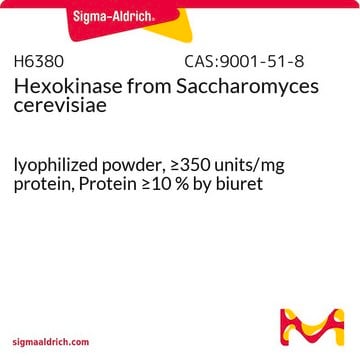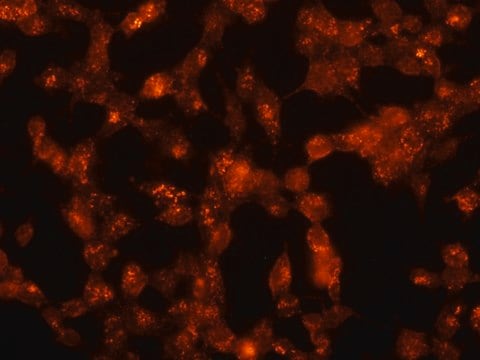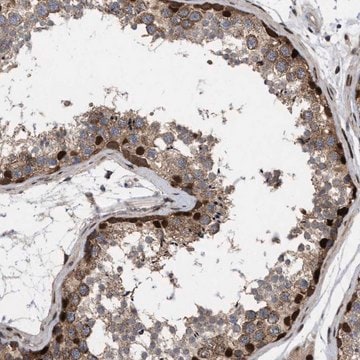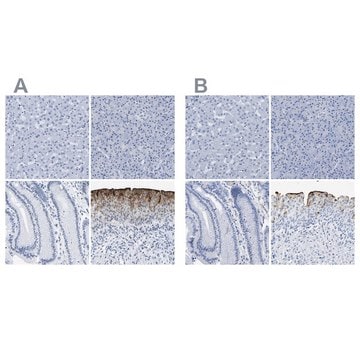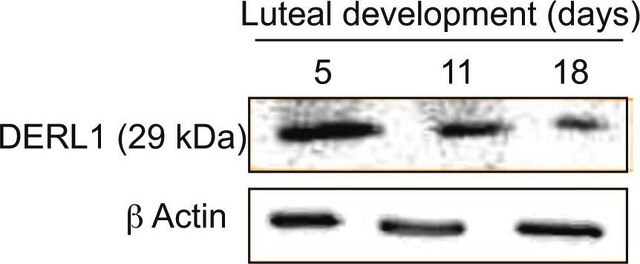推荐产品
生物源
rabbit
品質等級
共軛
unconjugated
抗體表格
affinity isolated antibody
抗體產品種類
primary antibodies
無性繁殖
polyclonal
產品線
Prestige Antibodies® Powered by Atlas Antibodies
形狀
buffered aqueous glycerol solution
物種活性
human
加強驗證
independent
orthogonal RNAseq
Learn more about Antibody Enhanced Validation
技術
immunohistochemistry: 1:200- 1:500
免疫原序列
QILNAYLVRVGANGTCLWDPNFQGLCNPPLSAATEYRFKYVLVNMSTGLVEDQTLWSDPIRTNQLTPYSTIDTWPGRRSGGMIVIT
UniProt登錄號
運輸包裝
wet ice
儲存溫度
−20°C
目標翻譯後修改
unmodified
基因資訊
human ... UPK3A(7380)
一般說明
The gene uroplakin-3a (UPK3A) is mapped to human chromosome 22q. It is a transmembrane protein and is present at the apical membrane of superficial umbrella cells of urothelium.
免疫原
Uroplakin-3A Precursor recombinant protein epitope signature tag (PrEST)
應用
All Prestige Antibodies Powered by Atlas Antibodies are developed and validated by the Human Protein Atlas (HPA) project and as a result, are supported by the most extensive characterization in the industry.
The Human Protein Atlas project can be subdivided into three efforts: Human Tissue Atlas, Cancer Atlas, and Human Cell Atlas. The antibodies that have been generated in support of the Tissue and Cancer Atlas projects have been tested by immunohistochemistry against hundreds of normal and disease tissues and through the recent efforts of the Human Cell Atlas project, many have been characterized by immunofluorescence to map the human proteome not only at the tissue level but now at the subcellular level. These images and the collection of this vast data set can be viewed on the Human Protein Atlas (HPA) site by clicking on the Image Gallery link. We also provide Prestige Antibodies® protocols and other useful information.
The Human Protein Atlas project can be subdivided into three efforts: Human Tissue Atlas, Cancer Atlas, and Human Cell Atlas. The antibodies that have been generated in support of the Tissue and Cancer Atlas projects have been tested by immunohistochemistry against hundreds of normal and disease tissues and through the recent efforts of the Human Cell Atlas project, many have been characterized by immunofluorescence to map the human proteome not only at the tissue level but now at the subcellular level. These images and the collection of this vast data set can be viewed on the Human Protein Atlas (HPA) site by clicking on the Image Gallery link. We also provide Prestige Antibodies® protocols and other useful information.
生化/生理作用
Uroplakin-3a (UPK3A) forms heterodimer with another member of the same family, UPK1B. Absence of UPK3A in mouse model causes abnormal targeting of UPK1B.In addition, absence of UPK3A in urothelium causes formation of small plaques, leakiness and results in hydronephrosis. UPK3A is involved in uropathogenic Escherichia coli invasion. It interacts with the bacterial type-1 pilus adhesion, FimH, and undergoes phosphorylation with subsequent elevation of intracellular calcium. These signaling events are crucial for bacterial invasion and urothelial apoptosis. UPK3A is associated with urothelial carcinoma. UPK3A is up-regulated in vesicoureteral reflux, a common congenital urinary tract anomaly.
特點和優勢
Prestige Antibodies® are highly characterized and extensively validated antibodies with the added benefit of all available characterization data for each target being accessible via the Human Protein Atlas portal linked just below the product name at the top of this page. The uniqueness and low cross-reactivity of the Prestige Antibodies® to other proteins are due to a thorough selection of antigen regions, affinity purification, and stringent selection. Prestige antigen controls are available for every corresponding Prestige Antibody and can be found in the linkage section.
Every Prestige Antibody is tested in the following ways:
Every Prestige Antibody is tested in the following ways:
- IHC tissue array of 44 normal human tissues and 20 of the most common cancer type tissues.
- Protein array of 364 human recombinant protein fragments.
聯結
Corresponding Antigen APREST74564
外觀
Solution in phosphate-buffered saline, pH 7.2, containing 40% glycerol and 0.02% sodium azide
法律資訊
Prestige Antibodies is a registered trademark of Merck KGaA, Darmstadt, Germany
免責聲明
Unless otherwise stated in our catalog or other company documentation accompanying the product(s), our products are intended for research use only and are not to be used for any other purpose, which includes but is not limited to, unauthorized commercial uses, in vitro diagnostic uses, ex vivo or in vivo therapeutic uses or any type of consumption or application to humans or animals.
未找到合适的产品?
试试我们的产品选型工具.
儲存類別代碼
10 - Combustible liquids
水污染物質分類(WGK)
WGK 1
閃點(°F)
Not applicable
閃點(°C)
Not applicable
Ablation of uroplakin III gene results in small urothelial plaques, urothelial leakage, and vesicoureteral reflux.
Hu P
The Journal of Cell Biology, 151, 961-972 (2000)
Tomislav Tadin et al.
Pathology, research and practice, 210(5), 279-284 (2014-02-21)
Numerous immunohistochemical biomarkers for patients with urothelial bladder cancer have been identified in order to predict their biological behavior. The aim of this present study was to examine the uroplakin III (UPIII) expression in homogenous group of non-muscle invasive bladder
R Moll et al.
The American journal of pathology, 147(5), 1383-1397 (1995-11-01)
Uroplakins (UPs) Ia, Ib, II, and III, transmembrane proteins constituting the asymmetrical unit membrane of urothelial umbrella cells, are the first specific urothelial differentiation markers described. We investigated the presence and localization patterns of UPs in various human carcinomas by
Kiara Klopfer et al.
Anticancer research, 34(11), 6779-6784 (2014-11-05)
Urothelial carcinoma (UC) variants can be difficult to differentiate from carcinoma metastatic to the bladder. We examined immunostaining for uroplakin III in 43 cases of primary bladder UC variants including micropapillary UC (n=19), nested variant of UC (n=2), pleomorphic giant-cell
Praveen Thumbikat et al.
PLoS pathogens, 5(5), e1000415-e1000415 (2009-05-05)
Urinary tract infections are the second most common infectious disease in humans and are predominantly caused by uropathogenic E. coli (UPEC). A majority of UPEC isolates express the type 1 pilus adhesin, FimH, and cell culture and murine studies demonstrate
我们的科学家团队拥有各种研究领域经验,包括生命科学、材料科学、化学合成、色谱、分析及许多其他领域.
联系技术服务部门
